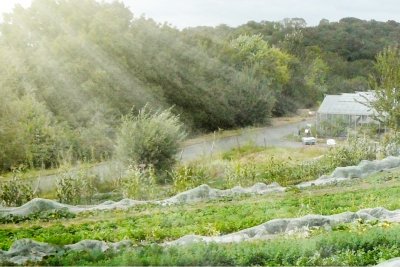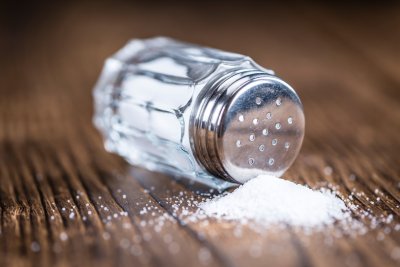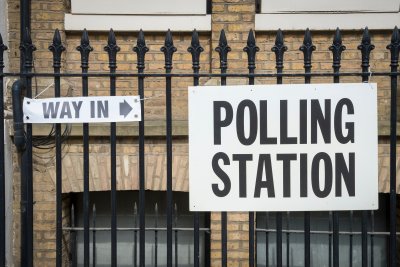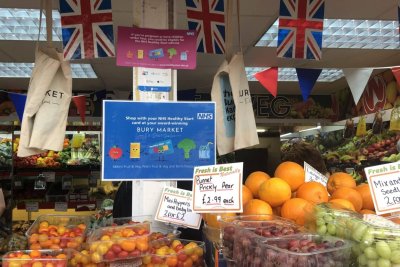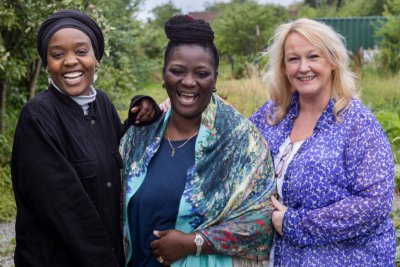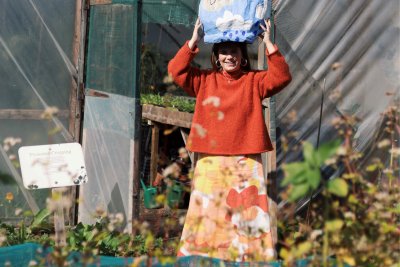Blogs • Climate Change and Nature
We eat too much meat and dairy - a balance is needed to avert societal breakdown
In this guest blog, Professor Tim Benton, speaker at the Sustain Meat Summit 12 October, argues eating less but better meat and dairy is the fastest way to reduce the global pressures on land and climate.
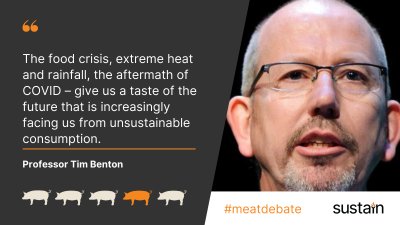
As many people appreciate, on a global basis, the environmental impact of the food system is huge, and, at the same time, poor diets are implicated as a causal factor in more illness and mortality than any other factor.
Animal agriculture is particularly note-worthy because of its impacts: about 80% of all the agricultural land is used for animals or their feed – that’s nearly 40% of all habitable land on the planet[1]. This land provides only about 17% of human-ingested calories, yet produces two thirds of the food system’s greenhouse gases.[2] Nowadays, across the UK+EU, over 60% of all grain grown on farms ends up as animal feed[3]. To illustrate the scale of this demand,
a 15% reduction in pig and chicken consumption across the EU would have nullified the global grain shortage caused by the War in Ukraine.[4]
Over the last decades, the more we have invested in intensive agriculture, whilst liberalising global trade, the cheaper the price of grain, making it economically cheap enough to support intensive livestock production, reducing the cost of meat, driving up its demand. We have created a vicious circle that supply begets demand which incentivises supply.
People the world over now have access to more protein (on average) than is needed for nutrition. Excess proteins are also excess calories, contributing to obesity, and meat, particularly processed red meats, can also impact on health – though to an extent that is contested.[5]
The demand for the goods and services that land produces – be it food, nature, carbon storage, bioenergy – is increasingly exceeding the ability of the world to supply it sustainably. Our favoured solution, to date, is through innovating in intensive agriculture. But this fails to be a solution because it ends up reducing prices, and stimulating more demand –overconsumption of food, and its impacts on health, waste, and new forms of consumption – feed for livestock and biofuels. This ratchet effect incentivises more supply, greater intensity of production, more consumption and more environmental damage.
As a result, the system is close to breaking. As we use land more intensively, we lose biodiversity, degrade soils, water and air, undermine equitable climate, and experience more relative yield-loss and volatility – with the global consequences for food security and stability that we have experienced this year. This year’s food crisis is arguably an interaction between three causes: COVID-19 (itself made more likely by environmental change), bad weather reducing yields (made more likely by climate change), and the War (partly motivated by the increasing geostrategic value of productive land).
Instead of focusing on intensification for supply-side productivity/efficiency, we now need actively to reduce demand. If we are to live within a safe environment, we have to reduce the global pressures on land and climate. As the first paragraph illustrates, the consumption of animal-sourced food has a disproportionately larger effect on sustainability than that of plant-based foods, and, typically, we also eat more than we need for a healthy life. This year’s events – the food crisis, extreme heat and rainfall, the aftermath of COVID – give us a taste of the future that is increasingly facing us from unsustainable consumption. As the environment fights back, societies are increasing destabilised, and conflict emerges as a consequence.
The future is not “just” more climate change and biodiversity loss, but a more unstable society.
Yet, eating less meat and dairy – particularly in high income countries – is the fastest way to reduce pressure on land and natural resources. I don’t want my children and grandchildren to live in a destabilising and polarising world. I’d rather eat less meat and dairy, focussing less consumption on sustainably sourced, agro-ecologically produced products that are more environmentally beneficial. Even though agro-ecologically produced meat may– per kg – emit more GHG, if I eat sufficiently less, my personal footprint falls, and such meat, arising from mixed farming systems that are more supportive of biodiversity, soils and may be less polluting, is environmentally beneficial in the round.
So, my hope is that the polarised debate – meat is good or bad – can converge on “less but better”, giving space for reduced consumption (without household spending increasing, balancing less but more expensive products) and reduced production (but better profits) and tackling the environmental crisis. In the long run, if farm incomes increases, dietary health increases by adopting more plant-based diets, consumers don’t spend more, farmers’ incomes don’t decrease, and we leave the world a better place for our next generations there is a balanced outcome to this debate that benefits all.
[1] https://ourworldindata.org/land-use
[2] https://www.nature.com/articles/s43016-021-00358-x
[3] https://fefac.eu/wp-content/uploads/2021/12/FF_2021_final.pdf
[4] https://www.chathamhouse.org/2022/04/ukraine-war-and-threats-food-and-energy-security
[5] https://www.science.org/doi/abs/10.1126/science.aam5324
Join us to take part in the #meatdebate.
Book your tickets now for the Sustain Summit 12 October
Published Tuesday 20 September 2022
Climate Change and Nature: Sustain has taken a keen interest in the rapidly accumulating evidence about the effect of food and farming on climate change and nature, as scientific evidence emerges that our food system is a very significant contributor to greenhouse gas emissions and biodiversity loss.
